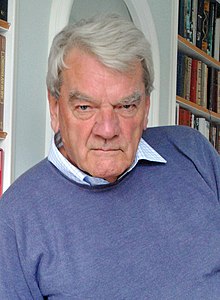
Back ديفيد إيرفينغ Arabic ديفيد ايرفينج ARZ Дейвид Ървинг Bulgarian David Irving Catalan David Irving Czech David Irving CY David Irving Danish David Irving German Ντέιβιντ Ίρβινγκ Greek David Irving EO
David Irving | |
|---|---|
 Irving in 2012 | |
| Born | 24 March 1938 Hutton, Essex, England |
| Occupation |
|
| Language |
|
| Education | Brentwood School, Essex |
| Alma mater | |
| Years active | 1962–present |
| Notable works | |
| Spouse |
María del Pilar Stuyck
(m. 1961; div. 1981) |
| Partner | Bente Hogh (since 1992) |
| Children | 5 |
David John Cawdell Irving (born 24 March 1938) is an English author who has written on the military and political history of World War II, especially Nazi Germany. He was found to be a Holocaust denier in a UK court in 2000 as a result of a failed libel case.[1]
Irving's works include The Destruction of Dresden (1963), Hitler's War (1977), Churchill's War (1987) and Goebbels: Mastermind of the Third Reich (1996). In his works, he argued that Adolf Hitler did not know of the extermination of Jews, or, if he did, he opposed it.[2] Though Irving's negationist claims and views of German war crimes in World War II (and Hitler's responsibility for them) were never taken seriously by mainstream historians, he was once recognised for his knowledge of Nazi Germany and his ability to unearth new historical documents, which he held closely but stated were fully supportive of his conclusions.[3] His 1964 book The Mare's Nest about Germany's V-weapons campaign of 1944–45 was praised for its deep research but criticised for minimising Nazi slave labour programmes.[4]
By the late 1980s, Irving had placed himself outside the mainstream of the study of history, and had begun to turn from "'soft-core' to 'hard-core' Holocaust denial", possibly influenced by the 1988 trial of Holocaust denier Ernst Zündel.[5] That trial, and his reading of the pseudoscientific[Note 1] Leuchter report, led him to openly espouse Holocaust denial, specifically denying that Jews were murdered by gassing at the Auschwitz concentration camp.[6][7]
Irving's reputation as a historian was further discredited[Note 2] in 2000, when, in the course of an unsuccessful libel case he filed against the American historian Deborah Lipstadt and Penguin Books, High Court Judge Charles Gray determined in his ruling that Irving willfully misrepresented historical evidence to promote Holocaust denial and whitewash the Nazis, a view shared by many prominent historians.[Note 3] The English court found that Irving was an active Holocaust denier, antisemite and racist,[8] who "for his own ideological reasons persistently and deliberately misrepresented and manipulated historical evidence".[8][9] In addition, the court found that Irving's books had distorted the history of Hitler's role in the Holocaust to depict Hitler in a favourable light.
- ^ Hare, Ivan & Weinstein, James (2010). Extreme Speech and Democracy. Oxford: Oxford University Press. p. 553. ISBN 978-0199601790.
- ^ Evans 2001, p. 101.
- ^ Guttenplan 2001, pp. 91, 277, 278
- ^ Neufeld, Michael J. (2009). "Creating a Memory of the German Rocket Program for the Cold War". In Dick, Steven J. (ed.). Remembering the Space Age. Government Printing Office. p. 81. ISBN 9780160867118.
- ^ Evans 2002, pp. 119–23
- ^ van Pelt, Robert Jan (2002). The Case for Auschwitz: Evidence from the Irving Trial (First ed.). Bloomington, Indiana: Indiana University Press. p. 15. ISBN 0-253-34016-0.
- ^ Evans 2001, p. 125.
- ^ a b "The ruling against David Irving". The Guardian. London. 11 April 2000. Retrieved 27 March 2010.
- ^ "Hitler historian loses libel case". BBC News. 11 April 2000. Retrieved 2 January 2010.
Cite error: There are <ref group=Note> tags on this page, but the references will not show without a {{reflist|group=Note}} template (see the help page).